Book contents
- Frontmatter
- Dedication
- Contents
- Preface
- Acknowledgements
- 1 Technology Questions
- 2 From Obscurity to Keyword: The Emergence of ‘Technology’
- 3 Ontology and Isolation
- 4 Science and Technology
- 5 The Sociality of Artefacts
- 6 Technological Artefacts
- 7 Technology and the Extension of Human Capabilities
- 8 Technology and Instrumentalisation
- 9 Technology and Autism
- 10 Technology, Recombination and Speed
- 11 Marx, Heidegger and Technological Neutrality
- Bibliography
- Index
3 - Ontology and Isolation
Published online by Cambridge University Press: 14 April 2017
- Frontmatter
- Dedication
- Contents
- Preface
- Acknowledgements
- 1 Technology Questions
- 2 From Obscurity to Keyword: The Emergence of ‘Technology’
- 3 Ontology and Isolation
- 4 Science and Technology
- 5 The Sociality of Artefacts
- 6 Technological Artefacts
- 7 Technology and the Extension of Human Capabilities
- 8 Technology and Instrumentalisation
- 9 Technology and Autism
- 10 Technology, Recombination and Speed
- 11 Marx, Heidegger and Technological Neutrality
- Bibliography
- Index
Summary
Ontology is usually defined very broadly as the study of being or as the study of the kinds of things that exist. But we all know something about ontology and use it on a daily basis. To use a simple example, a stick may be a useful tool to clean a carpet, but it would not be a very good tool for cleaning a window. We know this because we understand something about the natures, the being, of windows, carpets and sticks.
Ontology, has enjoyed something of a resurgence in recent years. However, it continues to elicit very different, often polarised, attitudes in social theory. Some view ontology as either irrelevant, a ‘fifth-wheel’ that generates no practical implications or concerns, or (if it does have implications) as an undesirable form of essentialism, most likely betraying some unreconstructed form of ‘modernism’. For others, myself included, ontology is viewed as essential and non-optional in the sense that all social theorising presupposes some kind of ontology, and it is better to be explicit about this than to remain wedded to an implicit ontology that may well be fraught with important problems and inconsistencies. It is fair to say that amongst those currently concerned with the study of technology, it is the former view that tends to dominate. The main task of this chapter is to argue for a particular conception of ontology that can be useful for the study of technology whilst avoiding the usual criticisms levelled at it.
More specifically, this chapter first provides some of the context to these differing views concerning ontology's significance. It then lays out a broad conception of ontology that, it is hoped, might meet the concerns of even those who tend to be suspicious or critical of ontology. In so doing, this chapter also introduces and develops a series of ontological arguments, concepts and distinctions that will be drawn upon throughout the remaining chapters.
Contextualising Ontology
The term ‘ontology’ dates back to at least the late scholastic writers of the seventeenth century. The traditional understanding of the term is the science or study of being, deriving from the Greek ‘onto’ (being) and ‘logos’ (study or science). Defined in this way, of course, ontology might involve the study of just about anything, and those who dismiss ontology as irrelevant often make just this point.
- Type
- Chapter
- Information
- Technology and Isolation , pp. 31 - 51Publisher: Cambridge University PressPrint publication year: 2017



